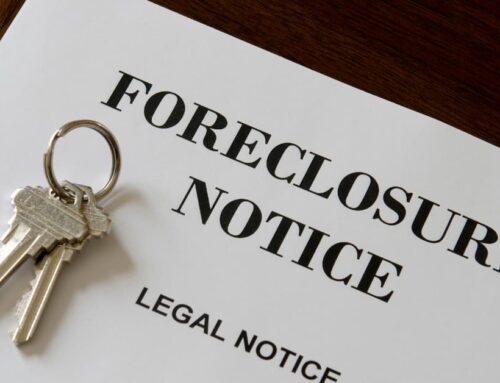It is too late to stop a foreclosure once the property has been sold at auction to a new owner. Until that moment, you still have legal options that may allow you to delay or prevent foreclosure entirely.
If you’re behind on your mortgage or have received a foreclosure notice, you’re not alone. Many homeowners assume that once foreclosure proceedings begin, it is the end of the road. In reality, there are multiple points in the process where you can still take action to protect your home.
This blog explains the full foreclosure timeline, highlights the critical deadlines, and outlines practical legal and financial strategies you can use to stop the process. A qualified real estate attorney can also help you understand your rights and represent you in negotiations or court proceedings.
Whether you’re in the early stages or facing an imminent sale, this guide will show you how to act quickly and effectively before it’s truly too late.
Read on to learn what steps to take before losing your home becomes a reality.
Understanding the Foreclosure Timeline
Foreclosure is a legal process lenders use to recover the balance of a loan when a borrower defaults. While it does not happen overnight, the timeline can move quickly. Understanding each stage gives you the opportunity to intervene before it’s too late.
1. Missed Mortgage Payments
After about 30 days without payment, the lender will typically reach out with a reminder or warning. This is your first opportunity to take action by contacting your lender or exploring loan assistance options.
2. Notice of Default (NOD)
Usually issued after 90 days of missed payments, the Notice of Default is a formal document stating that you’re in breach of your mortgage agreement. This is when the foreclosure process officially begins. At this point, you can still work with your lender on loan modification, forbearance, or repayment plans.
3. Pre-Foreclosure Period
Between the NOD and the sale notice, homeowners are often allowed time to resolve the issue. This may include reinstating the loan, selling the property, or applying for assistance programs. Legal counsel can be especially helpful in this phase.
4. Notice of Sale
If no resolution is reached, the lender issues a Notice of Sale and schedules an auction. This notice is often posted publicly and may be sent directly to you. Time is critical here. Bankruptcy, a short sale, or other legal interventions must happen fast.
5. Foreclosure Auction
The home is sold to the highest bidder or repossessed by the lender. Once the sale is complete, your rights to the property are effectively lost.
6. Eviction
If the home is sold, the new owner may begin eviction proceedings. You will typically receive a notice to vacate and may be forcibly removed if you don’t comply within a set period.
Important Note: Until the moment the home is sold at auction, you still have legal and financial tools available to stop the foreclosure. Acting early gives you the best chance at saving your home.
The Critical Cutoff: When Is It Truly Too Late?
The absolute point of no return in a foreclosure process is when the home is sold at a foreclosure auction and ownership legally transfers to another party. Once this transaction is finalized, your legal right to reclaim the home is lost, and you can no longer halt the foreclosure through court orders, negotiations, or payment arrangements.
That said, there are rare circumstances in some states where homeowners may have a brief redemption period even after the auction. This period allows a borrower to repurchase the property by paying the full amount owed, including fees. However, redemption is not guaranteed, is time-sensitive, and often comes with strict conditions.
The closer you get to the auction date, the fewer options you have and the more urgency is required. Strategies such as filing for Chapter 13 bankruptcy, seeking loan modifications, or pursuing legal action must be initiated well before the gavel falls at the auction. Once the home changes hands, even the courts typically cannot reverse the sale.
This is why it is crucial to act early and consult with a foreclosure or real estate attorney as soon as possible. They can help you evaluate your options, represent you in negotiations, and potentially stop the sale before it is too late.
Strategies to Stop a Foreclosure Before the Sale
If you are facing foreclosure, the good news is that you may still have several powerful tools to delay or prevent the sale of your home. Below are some of the most effective legal and financial strategies:
1. Reinstate Your Mortgage
You can bring your mortgage current by paying the total amount of missed payments, along with any late fees and legal costs. Many states give you the legal right to reinstate the loan up to a specific deadline before the foreclosure sale.
2. Request a Loan Modification
Negotiate with your lender to change the terms of your loan. This could include lowering your interest rate, extending the length of the loan, or adding missed payments to the balance. A successful modification can make your mortgage more affordable and stop foreclosure.
3. Apply for Forbearance
Ask your lender for temporary relief from payments due to financial hardship. Forbearance agreements may pause or reduce your payments for a set period. Be aware that you will eventually need to repay the missed amount, so plan accordingly.
4. File for Chapter 13 Bankruptcy
Filing Chapter 13 triggers an automatic stay, which immediately stops foreclosure activity. It allows you to repay missed mortgage payments over a three to five-year period as part of a court-approved repayment plan.
5. Consider Chapter 7 Bankruptcy
While Chapter 7 does not stop foreclosure permanently, it can delay the process. It also discharges other debts, which might make it easier for you to afford your mortgage going forward. However, it will not help you catch up on missed payments.
6. Redeem the Property
Some states allow homeowners to redeem the property by paying the full loan balance, plus fees and interest, before the auction. This option requires significant funds but may be viable if you are selling or refinancing.
7. File a Legal Challenge
If the lender violated your rights or failed to follow proper foreclosure procedures, you may be able to file a lawsuit to stop or delay the process. Legal challenges are especially relevant in nonjudicial foreclosures where court oversight is limited.
Before pursuing any of these options, it is wise to speak with a foreclosure defense or real estate attorney. They can assess your situation, help you choose the best course of action, and ensure that your rights are protected at every stage.
What If the Sale Date Is Approaching?
If your foreclosure sale date is just days away, time is critical, but you may still have options to halt the process.
One of the most effective last-minute tools is filing for Chapter 13 bankruptcy, which triggers an automatic stay. This legal protection immediately stops the foreclosure process, even if the auction is scheduled for the same day. Chapter 13 allows you to create a repayment plan to catch up on your mortgage over time while keeping your home.
Another option is to request a temporary restraining order (TRO) from a court. If you have legal grounds such as errors in the foreclosure process or lender misconduct, a TRO can pause the sale while the court reviews your case.
In these urgent situations, it is essential to consult a foreclosure or real estate attorney right away. An experienced attorney can assess your timeline, file the necessary paperwork, and help you take fast legal action to protect your home. Acting even one day too late can eliminate your remaining rights, so do not delay.
How to Avoid Foreclosure in the First Place
Preventing foreclosure is always easier than stopping it once the process has started. Here are some proactive steps you can take to avoid foreclosure altogether:
Contact your lender early if you are struggling with payments. The sooner you reach out, the more options you will have.
Apply for loan modification or forbearance as soon as you experience financial hardship.
Work with a HUD-approved housing counselor. These professionals can help you understand your options and negotiate with your lender.
Watch out for foreclosure scams. Only deal with reputable professionals and avoid companies that promise guaranteed results for a fee.
Keep detailed records of all communication with your lender, including emails, letters, and phone call notes. These records can support your case if disputes arise.
Being proactive and informed is your best defense against foreclosure. The more quickly you act, the more control you will have over your financial future.
Take Action Before It Is Too Late
Foreclosure is a process, not a single event. That means you have time to act if you take the right steps early enough. Whether you apply for a loan modification, file for bankruptcy, or negotiate a repayment plan, your chances of saving your home increase the sooner you take action.
Do not wait for the auction notice to arrive. Speak with a real estate attorney today to understand your rights and explore your options. With the right support and timely action, you can protect your home and regain financial stability.
Frequently Asked Questions About Stopping Foreclosure
When is it too late to stop foreclosure?
It is too late to stop a foreclosure once the home is sold at auction and legal ownership has transferred to a new buyer. Up until that point, you may still be able to halt the process using tools like bankruptcy, reinstatement, or loan modification.
When is it too late to stop foreclosure in Texas?
In Texas, the foreclosure process moves quickly. Homeowners generally have until the auction date to take legal action. Options such as reinstating the mortgage, filing for bankruptcy, or requesting a temporary restraining order must be completed before the home is sold.
How can I stop foreclosure?
Foreclosure can often be stopped by working directly with your lender, applying for a loan modification or forbearance, or filing for bankruptcy. It’s important to act early and explore all available options to avoid losing your home.
How do I stop a foreclosure auction immediately?
If a foreclosure sale is imminent, filing for Chapter 13 bankruptcy can trigger an automatic stay that pauses the process. Another legal strategy is to request a temporary restraining order from a court if your rights have been violated during the foreclosure.
Can you stop foreclosure once it starts?
Yes. Even after the foreclosure process begins, you may have time to resolve the default. Lenders may be open to negotiation, and legal protections may allow you to pursue loan modifications, forbearance, or bankruptcy.
How do I get out of foreclosure?
You can get out of foreclosure by catching up on missed payments, selling the home, or negotiating a new repayment plan. Legal solutions like bankruptcy may also allow you to restructure debt and protect your property.
Can I stop a foreclosure by paying the past due amount?
Yes, this is known as reinstating your mortgage. If you can pay the total amount owed, including missed payments, late fees, and legal costs, by the reinstatement deadline, the lender is generally required to halt the foreclosure process. This option is most effective early in the timeline, so acting quickly is essential.
Does bankruptcy stop foreclosure?
Bankruptcy can stop foreclosure, especially Chapter 13, which allows you to repay missed mortgage payments over time. Chapter 7 may only delay foreclosure, but it can help eliminate other debts and buy you time to explore alternatives.






